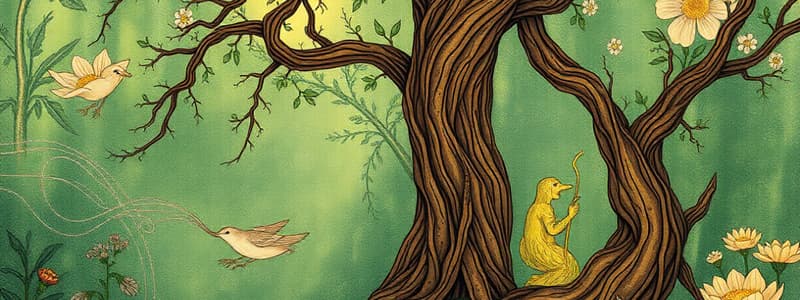Podcast
Questions and Answers
¿Cuál de las siguientes afirmaciones describe correctamente el ciclo del carbono?
¿Cuál de las siguientes afirmaciones describe correctamente el ciclo del carbono?
- El carbono se mueve entre el aire, organismos y suelo. (correct)
- Los animales obtienen carbono solo de otros animales.
- Los seres humanos son los únicos responsables de la transformación del carbono.
- Las plantas liberan carbono dióxido en el suelo.
¿Qué proceso no forma parte del ciclo del agua?
¿Qué proceso no forma parte del ciclo del agua?
- Condensación
- Transpiración
- Evaporación
- Fijación (correct)
¿Cómo se recupera el fósforo en el ciclo del fósforo?
¿Cómo se recupera el fósforo en el ciclo del fósforo?
- A través de la contaminación del aire.
- Por la fijación atmosférica realizada por bacterias.
- Mediante la lluvia ácida.
- Cuando las plantas mueren y se descomponen. (correct)
¿Cuál de los siguientes enunciados es verdadero sobre el ciclo del nitrógeno?
¿Cuál de los siguientes enunciados es verdadero sobre el ciclo del nitrógeno?
¿Cuál es una consecuencia de la escasez de fósforo en el ciclo de nutrientes?
¿Cuál es una consecuencia de la escasez de fósforo en el ciclo de nutrientes?
Flashcards
Carbon Cycle
Carbon Cycle
The movement of carbon between the atmosphere, organisms, and soil.
Water Cycle
Water Cycle
The continuous movement of water on Earth through evaporation, condensation, and precipitation.
Biogeochemical Cycles
Biogeochemical Cycles
Processes that move and transform essential elements in nature, maintaining ecosystem balance.
Phosphorus Cycle
Phosphorus Cycle
Signup and view all the flashcards
Nitrogen Cycle
Nitrogen Cycle
Signup and view all the flashcards
Fotosíntesis en el Ciclo del Carbono
Fotosíntesis en el Ciclo del Carbono
Signup and view all the flashcards
Ciclo del Fósforo: Importancia
Ciclo del Fósforo: Importancia
Signup and view all the flashcards
Fijación de Nitrógeno
Fijación de Nitrógeno
Signup and view all the flashcards
Ciclo Biogeoquímico: Equilibrio
Ciclo Biogeoquímico: Equilibrio
Signup and view all the flashcards
Ciclo del Agua: Evaporación
Ciclo del Agua: Evaporación
Signup and view all the flashcards
Study Notes
Biogeochemical Cycles Summary
- Biogeochemical cycles move and transform essential elements in nature.
Carbon Cycle
- Carbon moves between air, organisms, and soil.
- Plants absorb CO2 during photosynthesis to create carbohydrates.
- Animals obtain carbon by consuming plants.
- Organisms release carbon back into the soil when they die.
Water Cycle
- Water circulates through evaporation, condensation, and precipitation.
- The sun heats water bodies, causing evaporation.
- Vapor cools and forms clouds, which then produce rain or snow.
Nitrogen Cycle
- Atmospheric nitrogen is fixed by bacteria into usable forms (e.g., nitrate) for plants.
- Animals obtain nitrogen by consuming plants.
- Decomposition and waste release nitrogen back to the soil.
Phosphorus Cycle
-
Phosphorus is found in rocks and minerals.
-
Plants absorb phosphorus from the soil.
-
When plants die, phosphorus returns to the soil.
-
Phosphorus is essential for life, but its scarcity can limit plant growth.
-
These cycles maintain ecosystem balance and are vital for life on Earth.
Studying That Suits You
Use AI to generate personalized quizzes and flashcards to suit your learning preferences.




